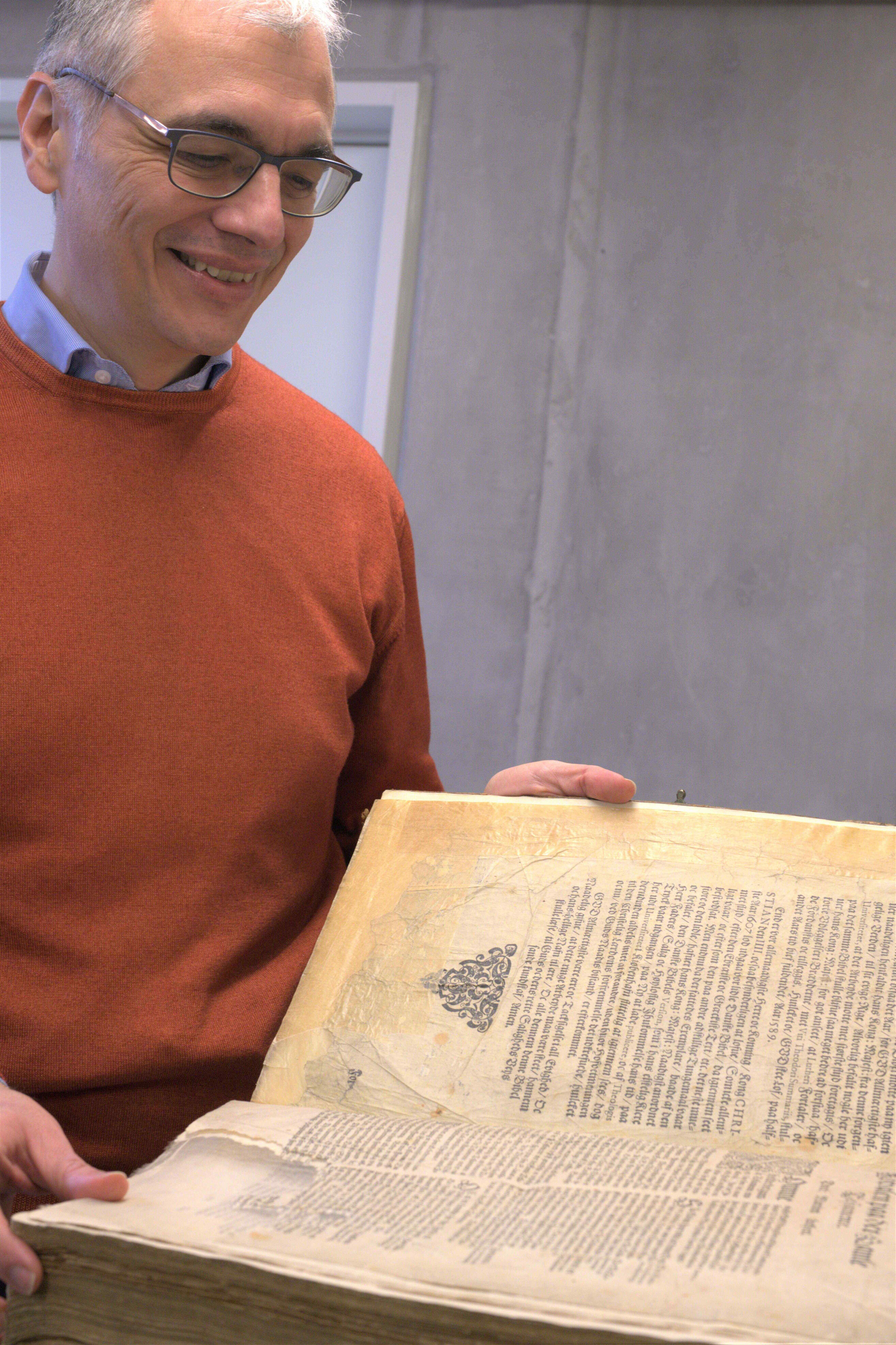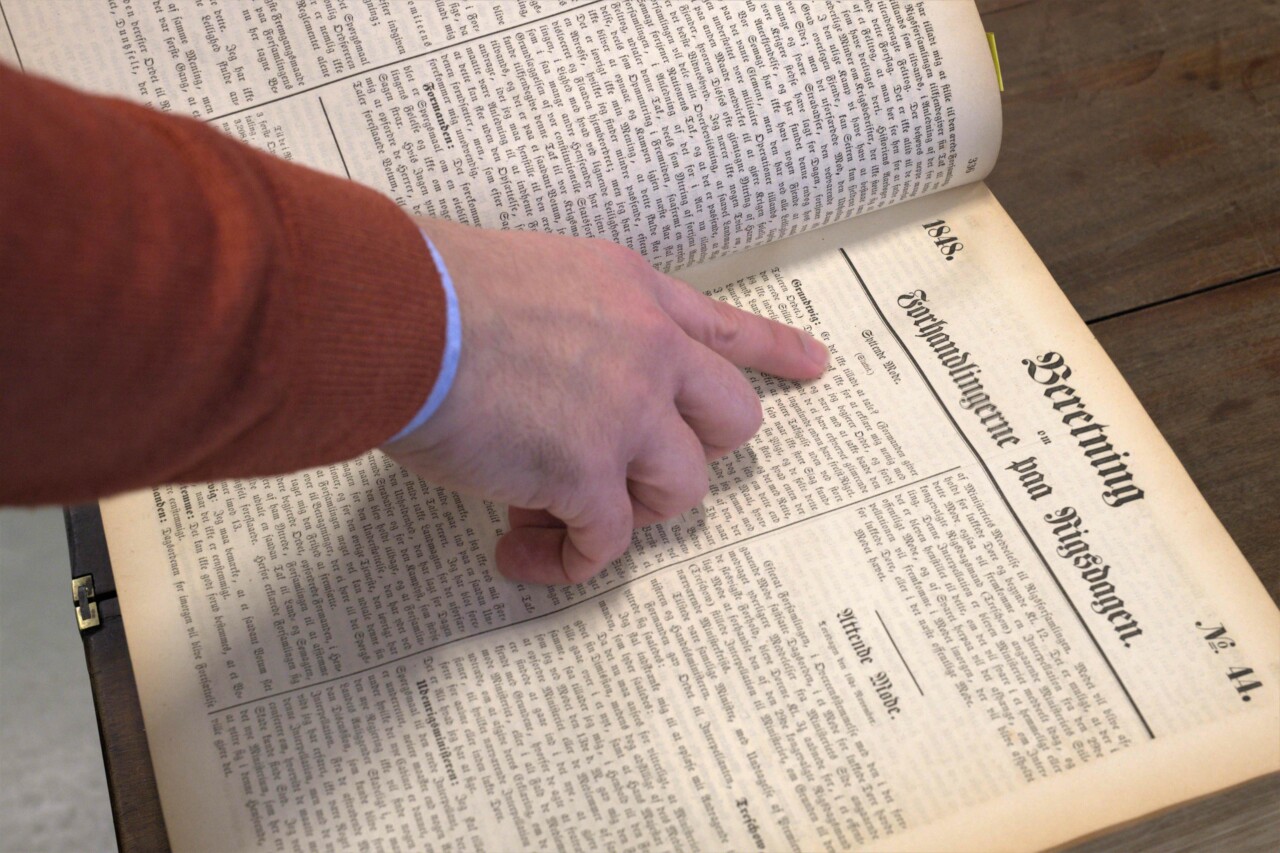Universitetsavisen
Nørregade 10
1165 København K
Tlf: 35 32 28 98 (mon-thurs)
E-mail: uni-avis@adm.ku.dk
—
Holdet
The team — From a job as head librarian at the Faculty of Law library to a senior consultant at the University of Copenhagen Library on South Campus. Massimo Soldano on moving from Italy to Denmark and on how technology and centralization took over the world of libraries.
Religion has started to be a lot more important to me after I moved to Denmark. Like most Italians, I grew up as a Catholic. But it was just a routine, like the Danish national Folkekirken church is for many Danes. When I moved to Denmark, I was suddenly a minority, because there are very few Catholics in Denmark. Then it became an identity thing for me, and suddenly religion meant more, because I started to link it to something personal and close to home. So I started to go to mass in Italian in Jesu Hjerte church on Stenosgade street. Today I go to the Danish Catholic church every Sunday.
About
Massimo Soldano, 50 years old, graduated as a lawyer from the University of Turin, Italy.
Was hired as an information specialist at the Faculty of Law’s library on Studiestræde street in 2010.
Senior consultant on South Campus since 2018.
Now affiliated with library services for the Faculty of Law, the Department of Communication and the Department of Arts and Cultural Studies (IKK).
I worked as a clerk at a lawyer’s office in Italy when I met my Danish wife. We moved to Denmark in 2007, where I started attending Danish classes at the Ballerup language centre and was subsequently employed at the Faculty of Law Library. My wife and I agreed that it was a bad strategy to have English as a common language. So we made an agreement that she would speak in Danish, and I would speak in Italian. That’s why our son speaks Danish and understands Italian. Unfortunately, I have a bad habit of also speaking Danish at home. I wanted to talk to him more in Italian, but I almost always forget to.
I turned 50 yesterday, so I took some time off work. I celebrated it with my family at a lunch restaurant, and the waiter gave me the menu in Italian because she heard me speak Italian. But I did not understand the Italian translation of the Danish lunch dishes at all. What do you call liver pâté and Christiansø herring in Italian? So I ended up getting a Danish menu card.
On the KUnet intranet it states that I am ‘first librarian’, but we no longer use that term. Now my job title is senior consultant, and most of my colleagues are information specialists. We still have the original function as librarian; to help people find their way through the labyrinth of information. But nowadays this labyrinth is electronic. I often help law students search for information when they have to write a bachelor’s project for example, because it is the first time that they have to search for literature. I had a student who had to write about the Danish constitution, and then I showed her the preparatory work for the Grundloven document, which we have in physical form here at the library. She was really pleased to see this, because students are not used to working with paper sources. I also do collection caretaking and make sure that the books are passed on to the right destinations when people reserve them. Collection caretaking is to ensure that the books are in their right place and that everything is in order.
Even though I didn’t dream of becoming a librarian, it has actually turned out to be a bit of a dream job. I’ve always had a passion for books, and I’m very happy with my nice colleagues. We have a good working environment here where we help each other out. And it is always a great pleasure when you have satisfied students that get the help they need.
The best thing about the job is probably the feeling it gives me when I’ve given some good guidance or helped someone over the counter. The human contact and direct recognition of my work makes it clear to you that your work has consequences for others. That’s also why I wouldn’t be able to work in the storage facility, like some of my colleagues do. They do not have direct contact with people because they have different responsibilities.
The team
If students and researchers are to shine at the University of Copenhagen, they need a good support system. We know them as technical and administrative staff, and we at the University Post want to celebrate them with this series.
»I stand on the shoulders of giants,« said Isaac Newton. And that’s the feeling I get when I read. The book as an object is important to me because it connects us to our past. What our society is now, is only the result of a whole lot that has been built before us. I think that in our time we like to cut ourselves off from our roots. But I think that the books have an important function, because they remind us where we come from. Paper books especially. Because when you take out a book, it has the same form as it has had for the past many centuries. The format is the same, and it still works.
I have a reading club with two upper-secondary school friends in Italy via WhatsApp. And this is actually fun, because with the reading club we combine modern technology and social media with old books from the 1500s. We are in the process of reading Jerusalem Delivered, which is an epic poem by the Italian author Torquato Tasso. On the WhatsApp chat, we share our opinions about the book. We have just got to chapter seven, and my friend has written that he thinks the chapter is off to a good start. I also read e-books on Kindle. It is actually very practical, like when you are on holiday.
I was once invited to both the University of Copenhagen’s Christmas party and the Royal Library’s Christmas party. But it was too much with two Christmas parties. I’m only invited to the Royal Library’s now. However, I still have access cards to both UCPH and the Royal Library. The University Library’s merger with the Royal Library has been a long process. The library was founded in 1482 but was first given a single name in 1797. Since then, it has been reorganised a number of times, and the departments have changed their name even more times. One of the most recent changes was in 2005, when the University Library merged with the Royal Library and became the University of Copenhagen Library, as we know it today. The merger meant that we went from smaller libraries to larger collections – centralisation in order to optimise resources. And this is very sensible, both with regard to the physical collections and the licensing agreements, where we are stronger together when we bargain with the major publishers.
The larger library departments have, unfortunately, increased the distance between the research environments and the library staff. When you are on the same corridor and share a coffee machine, it’s a bit easier to ask about something. I no longer share offices with the Law faculty, so we miss out on the daily contact where you exchange information, experiences and needs. The researchers are not as inclined to show up and ask us about something because there is a physical distance. In the old days, I had a direct connection to someone who I knew could answer something specific. I know, for example, student counsellor Karen Riskær Jørgensen, which the University Post has profiled previously. Now I have to speculate more about who it is precisely that I need to ask for a reply. This is an inevitable consequence of centralising.
One of the most remarkable books I’ve heard about is the bomb book. It is a book from 1522, which was at the University Library in the ceiling of the Trinitatis Church. The bomb book is really called ‘The Defender of Peace’ or Defencor Pacis, and it is a very important political treaty. The author, Marsilius from Padua, was from Italy, and he was one of the most important philosophers in the Middle Ages. But when Copenhagen was bombarded by the British in 1807, a cannonball went through the roof of the Trinitatis Church and through the book, and left a big, clean hole in it. It is ironic, of course, that a book on defending peace should be struck by a cannonball. Today, the book has been preserved in the library hall in the Round Tower on the floor above the Trinitatis church.
My favourite place at UCPH is the large atrium in KUA 2. It is a large room, typically packed with people, but in the exam periods in January and June, it is completely empty and very, very quiet. Then I sit next to the fountain early in the morning with a cup of coffee. This is really relaxing.
I find it fascinating that, in a secular society like Denmark, it is still possible to study theology at the University. If I were to study today, I would probably study theology or Greek. At the university in Italy, you can study the science of religion but not theology, because a clear distinction is made between the state and the church. Instead, it is the church that offers the degree programme in theology.

